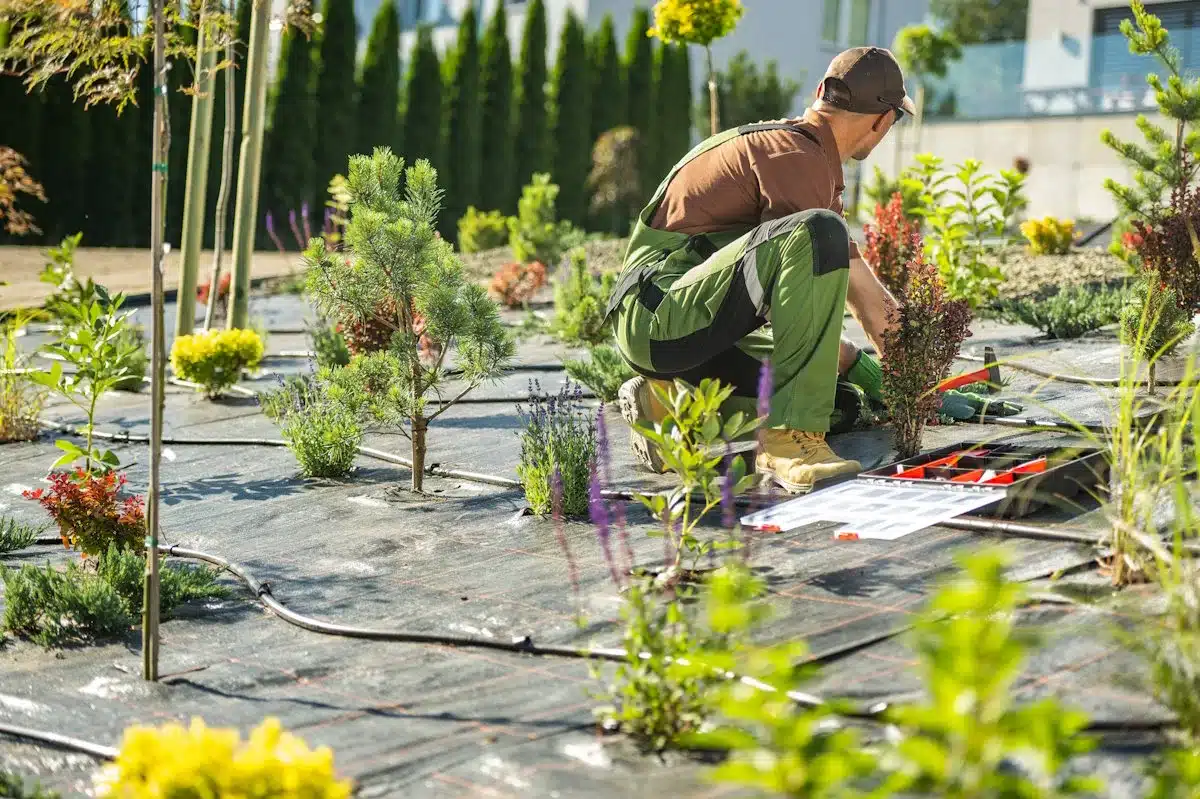Study garden irrigation online
This is a ten lesson course that covers the design, installation, maintenance, operation and evaluation of simple irrigation systems. If you need to have extensive skills in garden irrigation techniques, rather than just a basic working knowledge of how garden irrigation works, then this course is for you. Become a Garden Irrigation Specialist and advise, design and install effective and personalized irrigation systems, to enable plants to grow and flourish in gardens, parks and other horticultural settings.
For students already working with irrigation but wanting to learn more we recommend Irrigation Management (Horticulture).
- Learn about the equipment and techniques used for plant watering
- Learn to irrigate plants in gardens, plant nurseries, indoors, greenhouses, etc.
- Become a better gardener, nurseryman or horticulturist
You will Learn:
-
- Explain the significance of soil in irrigation.
- Explain how to determine when to irrigate in a small scale situation.
- Manage irrigation in a given situation.
- Explain the significance of different aspects of moving water including: drainage, pumps, filters, storage and recirculation.
- Select an appropriate irrigation system for a given situation.
- Explain the principles of design for a simple irrigation system.
- Design a simple irrigation system.
- Oversee the installation of an irrigation system.
Detailed Course Outline
This course is made up a number of lessons or units. Each of these has self assessment questions, a set task (practical homework) and an assignment which you can upload online.
There are 10 lessons in this course:
1. Introduction to Irrigation
-
- Objective of Irrigation
- Irrigation: The Wider View
- Sources of Water
- Feasibility of Irrigation
- How to Improve the Quality of Water From Any Source
- Likely Quality Problems in Different Kinds of Water
- Problems of Water Quality and There Remedies:
- Physical Impurities
- Chemical Impurities
- Biological Impurities
- Bacterial Impurities
2. Soil Characteristics and Problems
-
- Understanding Soils
- Naming the Soil
- Different Soils Suited to Different Purposes
- Improving Soils
- Chemical Properties of Soil: Soil pH (acidity/alkalinity), Sodicity, Salinity
- Physical Properties of Soil: Soil Uniformity, Available soil water capacity, Infiltration, Internal Drainage
- Soil and Water
- Kinds of Soil Moisture: Gravitational Water, Capillary Water, Hygroscopic Water
- Transpiration and Wilting Point
- A Feel-Test For Estimating Soil Moisture Level
- Fertigation
- Different Types of Fertigation Equipment
3. Estimating Plant Needs and Irrigation Scheduling
-
- When to Irrigate
- Signs to Look For: Symptoms of Water Deficiency, Symptoms of Water Excess
- Checklist For Home Gardeners
- Timing of Irrigations
- Measuring Water Available to Plants: Calculating Field Capacity, Calculating Permanent Wilting Point, Available Moisture Range
- Rooting Depths of Selected Plants
- Water extraction by roots
- Irrigation Calculations
- Estimating Water Needs
- Estimated Water Loss From Soil Under Different Climatic Conditions
- Tension meters
- Water Requirements of Turf Grasses
- Importance of Schedules
- Scheduling Irrigation
- Water Volumes and Duration
4. Drainage
-
- Drainage
- Improving Permeability During Construction: Cultivation, Adding Soil Ameliorants, Chemical Treatments
- Improving Surface Drainage After Construction
- Layout of Drains
- Outlet
- Gradients
- Distance between the Drainage Pipes
- Depth of Drains
- Laying the Drain
- Dams and Water Storage
- Soil Degradation
- Erosion: Water, Wind, Control
- Soil Acidification including Causes
- Soil Compaction
- Chemical Residues
- Waste Water Treatment Using Reed Beds
- Suitable Plants
5. Types of Irrigation Systems
-
- Flood Irrigation Systems
- Pressurized Irrigation systems
- Conventional Sprinkler Systems: Portable, Permanent, Semi-Permanent
- Mechanized Sprinkler Irrigation Systems
- Fixed Sprinkler Systems
- Quick-Coupling Systems
- Sprinkler Heads
- Mechanisms That Drive Rotating Head Sprinklers
- Design Considerations
6. Trickle Systems
-
- Trickle Irrigation
- Do It Yourself Micro Irrigation Systems
- Time Length of Watering
- Automatic Systems
- Maintenance of Watering Systems
- Micro-jet Irrigation
- Maintaining Your Trickle Irrigation
7. Design Specifications
-
- Hydraulics
- Calculating Discharge or Flow
- Velocity
- Friction Loss in Systems
- Water Hammer
8. Pumps and Filters
-
- Types of Pumps
- Pumps and Pressure Systems
- More on Types of Pumps
- What to do if a Centrifugal Pump Fails to Operate
- Trickle Irrigation: Prevention of Clogging
- Controllers
- Technical Data Sheet – Mechanical Tap Timer
9. Selecting the Right System for a Plant
-
- Water Saving Measures
- Filtration
- Flood Irrigation
- Sprinkler Irrigation
- Trickle Irrigation
- Example – Putting Greens
- Example Trickle Irrigation in Ornamental Gardens
- Example – Irrigation of Vines
10. Design and Operation of Systems
-
- Introduction: Cyclic Watering, Pulse Watering
- Scheduling Irrigation
- Sprinkler Spacings
- Designing and Considering Sprinkler Performance
- Electrical Factors
- Electric Automatic Systems
- Design Considerations
When you have completed the lessons of your Certificate course, you will be given the option of taking the optional exam. It’s okay if you don’t want the exam, we still issue your Careerline Certificate. For Advanced Certificates however, the exam is compulsory (per module) and are included in the course fee.

